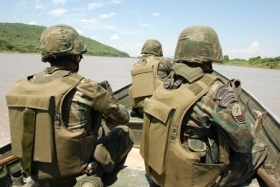Brazil has deployed 8,700 troops to the northern Amazon frontier, its fourth ambitious border crackdown in less than a year. But questions remain about Brazil’s ability to sufficiently plug the holes along its vast border, shared with 10 countries.
The border security operation, code-named “Agata 4,” will employ 8,700 troops from the Army, Navy, and Air Force, supported by 11 boats, nine helicopters, and 27 airplanes. The troops will patrol 5,500 kilometers of a remote stretch of border (see map below) shared with Venezuela, Guyana, Suriname, and French Guiana, between the mouth of the Oiapoque river and the municipality of Cucui, Amazonas state.
The operation is designed to stem the trafficking of drugs, contraband, and humans through aerial surveillance and ground patrols. Another priority is the destruction of illegal mines and airstrips. The military side of the operation is reportedly intended to last no more than a month before giving way to a longer term law enforcement presence.
Brazil’s military conducted three other border operations, also codenamed “Agata,” in 2011, targeting the midwestern and southern frontier. Two additional similar operations are planned for 2012. The military argues that these security surges are already reducing the availability of narcotics in certain border regions. According to BBC Brazil, the last operation, Agata 3, resulted in a 60 percent rise in the price of cocaine paste in the city of Carceres and a doubling of the price in Cuiaba, both in Mato Grosso state.
The Agata security surges are central to President Dilma Rousseff’s $6.3 billion border security strategy, an effort to stifle the flow of illicit goods across the country’s 17,000 kilometer border. While the crackdown has shown some results, mostly in terms of confiscated weapons, drug seizures, and arrests, there are concerns about the border plan’s long-term impact. According to the BBC, traffickers are known to prepare large shipments of drugs or contraband in anticipation of the military’s withdrawal, in order to compensate for the slow business during the security surge. In order to better ensure the permanent dismantling of these trafficking networks, the Ministry of Justice will reportedly oversee a more long-term deployment of law enforcement and intelligence officials to the Amazon, following the withdrawal of military troops, in an operation dubbed “Sentinel.”
In addition to the question of the border plan’s long-term impact, the other key challenge facing Brazil’s border security strategy is the scope it requires. The number of vunerable trafficking points — the Amazonian north, the west, the south — explains why the four “Agata” operations have taken place in so many different regions, rathern than focusing on a single area. Brazil is seeking to secure a border shared with 10 countries, including the world’s three biggest cocaine producers (Colombia, Peru, and Bolivia), to say nothing of its 7,500 km coastline, which has made the country a prize for drug traffickers seeking access to markets in Africa, the Middle East, and Europe. In additon to being a key transit point for drugs headed east, Brazil has become the continent’s largest import market for drugs. Both factors contribute to significant pressure on Brazil’s border authorities.
Brazil may not be able to properly secure its border without some cooperation from its neighbors, as demonstrated by the wave of security partnerships recently brokered with its neighbors, including Bolivia, Venezuela, and Colombia (an agreement with Peru is also being considered). But in terms of military and economic resources, few of these partnerships are on equal footing, and Brazil may have a difficult time reducing the flow of illicit goods into its borders if its neighbors don’t step up. This is particularly a problem along Brazil’s northern border, where Operation Agata 4 is being carried out: the Amazon is dense and difficult to patrol, and much of it is shared with Guiana and Suriname, both particularly small, poor, and limited in their capacity to combat the flow of illicit goods.
View InSight Map – Operacão Ágata 4 in a larger map

